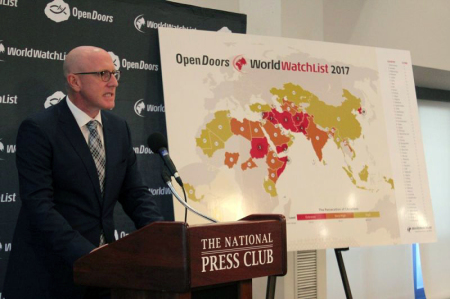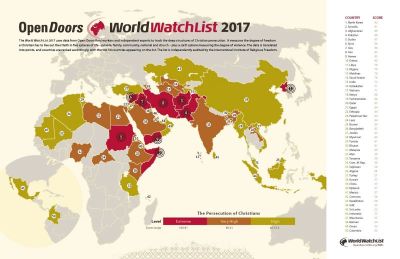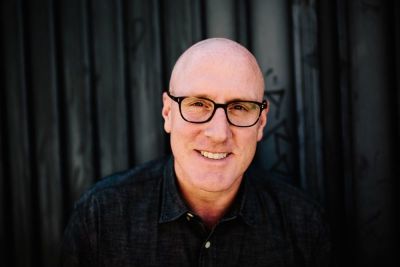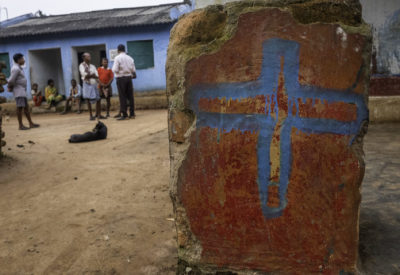American pastors failing to teach theology of persecution, Open Doors CEO David Curry says

American pastors are failing to teach a biblical theology of persecution, says Open Doors USA CEO David Curry, which contributes to an inattention to the rise of Christian persecution in countries such as Nigeria and India.
For the past 60 years, the non-denominational ministry Open Doors has traveled to the world's most oppressive regions to empower and equip persecuted Christians. The non-profit has been in more than 60 countries providing Bibles, training, and programs for anyone marginalized because of their beliefs. The organization also specializes in helping to restore faith communities that have been targets of persecution.

Curry became CEO in August 2013, and has traveled extensively into various persecuted areas to encourage his Christian brethren. He is now urging for other believers to pay attention to what’s currently happening in Nigeria to Christians at the hand of Boko Haram. The Jihadist group in Nigeria which is responsible for more than 34,000 deaths in the country since 2011.
There are now 91 million Christians in Nigeria and many others in India, China and other places around the world continually trusting Jesus for protection while facing persecution. Curry is charging pastors and leaders in the western world to come back to “reality” and keep their congregations informed while encouraging them to pray for those in danger.
Christian Post: What are the least known persecuted places in the world?

Curry: Nigeria is in that category because so many more people are killed in Nigeria than ISIS killed in a year. But yet, people won't talk about it the same way. I think that's a big problem in the media. I think it's an indictment of us as followers of Jesus in the West that we sort of don't pay attention, unless it's directly related to us, but these are our brothers and sisters and we need to go by the biblical mandate to care and to pray, as if these were our own brothers and sisters, members of our family. So I think Nigeria is one of those issues, that just needs to be in front of our minds so that the Christian church is praying, advocating, and letting our voice be heard.
I think India still fits in that category [as well]. People are well aware of India, everybody knows an Indian and has friends that are Indians. Here's the challenge, though, the view that we have is through the lens of Gandhi, “they’re peaceful and loving,” but what has shifted is over six years their national politics has become nationalistic. There is a group there running that country that has a radical Hindu agenda that wants to get rid of every religious minority —they want to whether it's Muslim or Christian. Right now there's almost 65 million Christians in India who have their rights restricted or are being punished or shut down, etc. so it's a significant problem even though people are well aware of India they may not be aware that the religious freedom has changed there.
CP: Why do you think the western world is in such a slumber concerning persecution?
Curry: I think it's a failure of leadership. I think it starts there. This is a bit of an indictment, but I think pastors ... they're not teaching their church about it, they're not teaching a biblical standard, they’re not teaching a theology of persecution.
The New Testament was written by persecuted Christians. There are books of the Bible that start with Paul in prison, and at the end, he’s still in prison. But we're not hearing that gospel in America, and I think it's created a chasm between us and the rest of the world. We are not living in reality. So I think it's an indictment of the leadership here in America and the West. It's not to say it can't turn around, but we need to have every church, every Sunday, talking, praying in some way about their persecuted brothers and sisters. It's a universal calling in the scripture that we are to pray for people who are in chains in the name of Jesus as if they were our own family and understand the theology of suffering.
I think that's part of it. I think then the rest of it is that we as American Christians are inundated with media at the same place as everyone is, we take our marching orders on what's important by what's on our Twitter feed. That’s a very unhealthy way to prioritize what's important because it's what's urgent but it doesn't allow us to focus on the things that are timeless and important. We're going to need to, just like everybody else, pull back from the fatigue of the constant media barrage of bad news from everywhere, and figure out, what are we called to focus on?
CP: You recently testified before Congress about persecuted Christians, can you share some of the things shared?
Curry: I testified before the Human Rights Committee, I think it's honored after the former congressman who had been in a concentration camp, Tom Lantos. I was at the Tom Lantos Committee on Human Rights and just shared with them what's going on around the world with the persecution and the violation of human rights against Christians.

One of the things we touched on was Nigeria, there's over 3,700 Christians who were killed last year, according to our data. Our data is always the most conservative because we only count what we can validate was directly related to persecution. It's certainly more than that, that were killed for their faith, but we can validate that over 3,700 were killed for their faith in Nigeria. So we talked about that, what can be done, what needs to be done. How important freedom of religious expression is to the human experience regardless of whether you're American, Nigerian, or North Korean, this is a human right, that all people should have the ability to have a personal faith, to study the Bible if you want and decide what you think about it. And if you decide to be a follower of Jesus, that you wouldn't be persecuted or harassed or beaten, or raped, or lose your job because of it.
CP: What can the U.S. government do or how can the U.S. affect what's happening over there?
Curry: Let me give you an example of Nigeria, but also India. I'll start with India.

India does a lot of business with American corporations. We give them a lot of aid, they want to be part of the international business community and it's a giant market for a lot of our businesses since there's a couple of billion people there. Yet, they are now, over the past six years since the BJP political party of President [Narendra] Modi has been in charge, they are systematically discriminating against Christians. They said they want to get rid of Christians, there's been hundreds of attacks, over 300 this year on Christian churches, hundreds of pastors have been detained without trial, arrested, imprisoned, sentenced. There's just been significant persecution against Christians in India over the last six years.
What the U.S. government can do is to look at these kinds of severe systematic violations of human rights and say, "We're not going to do business with you. We're not going to give you millions and millions of dollars in aid unless you want to be part of the international community of human rights, that everybody should have a right to worship freely." Assuming they're good citizens and they are not infringing on the rights of others. But that's not the case with Christians, these folks just want to go to church. They want to read the Bible, they want to have the freedom to be a Christian.
In some villages these people are kicked out, nothing's ever done about it. Churches are attacked, pastors are arrested, it's a very significant problem. I think the government can pass laws that say, "We're going to do business that if somebody wants to be a most favored nation, it's not just going to be monetary, it's not just going to be about denuclearization, it's going to be about their human rights record, as well."
CP: From the time that you stepped in as CEO of opened doors till now, has Christian persecution just continually been on the rise?
Curry: Unfortunately, in the time I've been here, yes, it has been and that’s because the key factors that are contributing to the statistical rise of persecution are still in place, nobody's addressing them.
Here’s a couple, first of all in communist or post-communist systems, North Korea, China, etc., those systems will inevitably, and do persecute greatly against religious faith and expression of religious faith. They are violating human rights every day. There are a lot of Christians in China who are facing monitoring, and restrictions, and even imprisonment, because of their Christian faith.
Secondly, you have spread of Islamic extremism. ISIS and their ideology, even though they've lost their territory, it’s spread. It’s in Northern Nigeria, it's always been for many years in Somalia. It's now in Asia. We saw that in Sri Lanka. So as long as that ideology exists there’s going to be a rise of persecution.
The third piece of this is the rise of nationalism. That's where I categorized India. It can be summarized in this sentence, "You are not a true Indian unless you're Hindu." That kind of thinking is leading to a sharp right and is stoked by the political party in power. That thinking is what's leading to unhealthy people in India attacking churches, and power hungry people in India arresting pastors.
CP: So what are some of the circumstances people of Open Doors face when there are boots on the ground?
Curry: One of the things we try to deal with, especially in northern Nigeria, is to provide trauma care to people who have seen just incredible things.
I shared with Congress yesterday the story of Zauna, she is a widow in the north of Nigeria, her village was attacked four times by Boko Haram (the ISIS related group) and her husband was burned alive right in front of her house because of their faith.
We want to go and help people like Zauna. So the upshot is that there's incredible trauma out there and our people see tough things. We're aware that they face danger but here's the thing about what we try to do at Open Doors, we're here to be present, to stand with the persecuted church. We stay focused on that, but we're aware of the risks and challenges of serving a population that faces suffering every single day.
CP: What are some of the ways you equip people to deal with the traumas of persecution?
Curry: We go into many parts of the world that have rising persecution and train pastors and try to help them learn quickly the lessons of the suffering church that we've seen around the world.
So for example, before the [Syrian] civil war, we were in Syria, talking with the Syrian church leadership of various denominations and helping them to understand because they weren't facing persecution, but we were telling them about these kinds of things to try to get them to understand what was coming. Then of course, just a couple years later, they were in a massive upheaval because of persecution of ISIS and being caught in between, in the [Syrian] civil war.
We absolutely provide training to help people stand strong through the storm.
CP: Is there a testimony of someone living through persecution that has really impacted you?
Curry: If I could just fill in that story of Zauna, because she's one of those people. She lives in the north of Nigeria, she and her husband were farmers and their village was attacked at least four different times. She lost her husband in one of those attacks. She's a follower of Jesus and she wants to be salt and light in that community, she's rebuilt her little one-room home. She's continuing to work her land. When asked if she wants to have vengeance against these people, she says, "I'm going to leave that to the Lord." She just wants to be a follower of Jesus and she's asking for protection and prayer. This gratitude that she shows, just thanks God that she's alive, it's just inspiring. This is where I learn so much, from people like that.
CP: What’s your ultimate goal at Open Doors?
Curry: Well the ultimate goal for Open Doors is not to stop persecution, the only way to stop persecution in this fallen world is to stop talking about Jesus and we don't encourage people to stop talking about Jesus. The ultimate goal is a strong and healthy church, united people, whether they worship in freedom or whether they're part of the persecuted church. That we care, that we pray, that we connect, that we learn and give and we're interdependent in a healthy way. So that's the goal, because we're not going to be able to stop persecution but we want people to stand strong in their faith and to know that they're not alone and the suffering Church must not be isolated church. And that's the goal!






















